Western and Eastern Christianity came together in a unique show of unity on Sunday night as Pope Francis prayed with the Orthodox Church’s “first among equals” in Jerusalem’s church of the Holy Sepulchre.
The encounter between the Pope Francis and Patriarch Bartholomew of Constantinople, regarded by their respective Churches as the successors to the Apostles Peter and his brother Andrew, came 50 years after Pope Paul VI met Patriarch Athenagoras here – a first in the 900 years since the Great Schism split the two Churches.
The Church leaders were 45 minutes late for the ceremony having taken part in extended talks, during which they signed a joint declaration of co-operation between their two Churches, which jointly make up 1.5 billion people.
That declaration said the meeting marked a “new and necessary step” on “the journey towards the unity to which only the Holy Spirit can lead us, that of communion in legitimate diversity.”
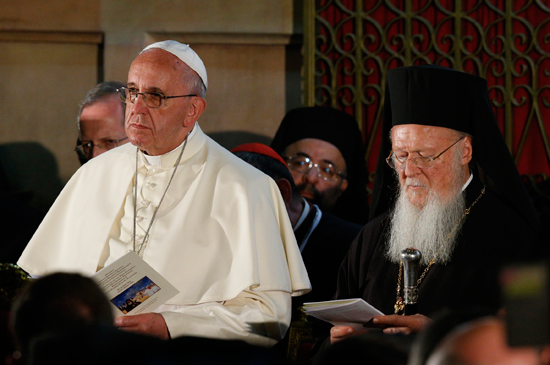
The service, in which both men venerated the place believed to be empty tomb of Christ, marked the spiritual centre-point of Pope Francis’s pilgrimage to the Holy Land, the official theme of which is: "So that they may be one."
As a Greek choir sang Orthodox hymns, Pope Francis and Patriarch Bartholomew entered the dark, candle-lit church held to be the site of the Crucifixion, burial and Resurrection of Jesus Christ.
The Pope looked emotional, if a little tired, as both men knelt at the Stone of the Anointing inside the entrance of the church, kissing the stone on which Joseph of Arimathea is believed to have prepared Christ’s body for burial, before proceeding inside to the Tomb.
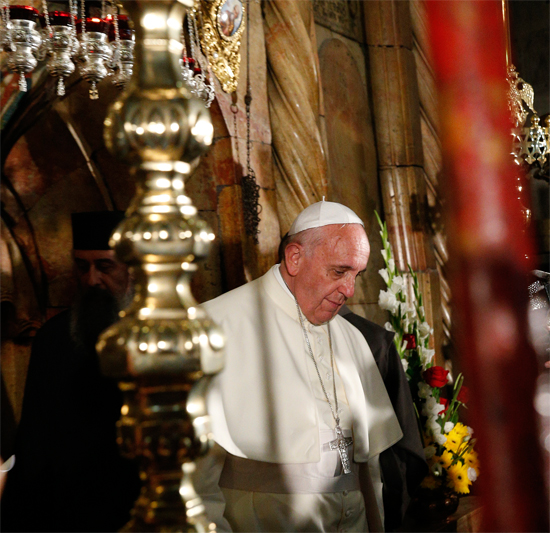
The account of the Resurrection from the Gospel of Matthew was sung in Latin and the book was then kissed by the Pope and Patriarch.
In his address, Bartholomew said that the empty tomb gives the message to “love the other; love the different.”
He described Pope Paul VI’s meeting with Patriarch Athenagoras as an “heroic initiative” and said church unity was the only way to fulfill the Lord’s will.
“This is the way that all Christians are called to follow in their relations among themselves – whatever Church or confession they belong to – thereby providing an example for the rest of the world,” he said. “The way may be long and arduous; indeed, to some it may occasionally seem like an impasse. However, it is the only way that leads to the fulfilment of the Lord’s will “that [His disciples] may be one.” (John 17:21)
In between their respective addresses, Pope Francis and Patriarch Bartholomew twice embraced, echoing the gesture made by their predecessors at the same place in 1964.
Pope Francis said the service was the high point of his pilgrimage.
“In this Basilica, which all Christians regard with the deepest veneration, my pilgrimage … now reaches its culmination” he said. “We are making this pilgrimage in the footsteps of our venerable predecessors, Pope Paul VI and Patriarch Athenagoras, who, with courage and docility to the Holy Spirit, made possible, 50 years ago, in this holy city of Jerusalem, an historic meeting between the Bishop of Rome and the Patriarch of Constantinople.”
He acknowledged the schism between the Churches. “Clearly we cannot deny the divisions which continue to exist among us, the disciples of Jesus: this sacred place makes us even more painfully aware of how tragic they are.”
But, he added: “[Fifty] years after the embrace of those two venerable Fathers, we realise with gratitude and renewed amazement how it was possible, at the prompting of the Holy Spirit, to take truly significant steps towards unity.”
The Pope added: “[Let] us put aside the misgivings we have inherited from the past and open our hearts to the working of the Holy Spirit.”
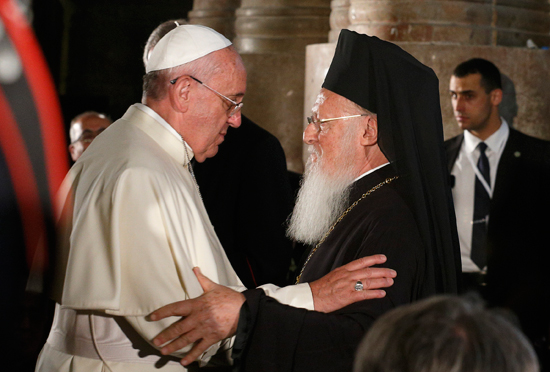
After a second embrace, in an unprecedented move the two Church leaders prayed the Lord’s Prayer in Italian and Greek, before they venerated the small tomb and lit candles and prayed in silence. As at the Church of the Nativity earlier on Sunday, Pope Francis bowed to enter the low entrance of the tomb.
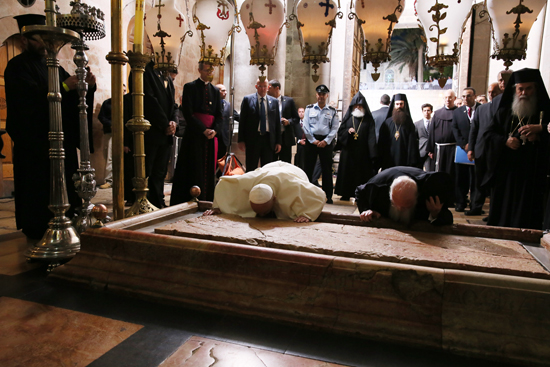
The 77-year-old pope and 74-year-old Patriarch then climbed the steep steps to the upper level of the church, traditionally held to be Calvary, where Jesus was crucified. There they again prayed together and lit candles.
The special ceremony at the Holy Sepulchre marked a rare moment of peace in the church which is regularly the scene of inter-denominational fights between the predominant communions: Catholic, Greek Orthodox and Armenian Orthodox.
The joint declaration signed before the service stated: “Our meeting, another encounter of the Bishops of the Churches of Rome and Constantinople founded respectively by the two Brothers the Apostles Peter and Andrew, is a source of profound spiritual joy for us … Our fraternal encounter today is a new and necessary step on the journey towards the unity to which only the Holy Spirit can lead us, that of communion in legitimate diversity.”
Earlier in the day, the Pope landed Ben Gurion airport near Tel Aviv for the official Israeli welcoming ceremony.
Israeli President Shimon Peres, who today accepted an invitation to the Vatican next month along with his Palestinian counterpart Mahmoud Abbas, praised the Pope’s care for the poor and described him as an opponent of anti-Semitism and a “bridge” between religions. And he stressed that Israel is a multi-cultural and pluralistic society.
“You have brought to the Holy See a noble and natural humility,” he said. “Deep identification with the poor, the oppressed and destitute … These values were voiced by the Prophets Isaiah and Amos in Jerusalem, and who represented a beacon to Jesus, the Nazarene, and to Saint Francis of Assisi, whose name and spirit you embraced, as Pope and Head of the Catholic Church. Your Holiness, we are grateful to you for assuming your sensitive and resolute stand against all expressions of anti-Semitism.”
Benjamin Netanyahu, the Israeli Prime Minister, also stressed that Pope Francis was taking a stand against anti-Semitism and praised the Pope’s “brave connection with the Jewish people”. Mr Netanyahu also referred to the book written jointly by Pope Francis and his friend Rabbi Abraham Skorka.
Controversially, Mr Netanyahu referred to Jerusalem as “our eternal capital.”
Responding, Pope Francis reiterated his call for a two-state solution to solve the Israeli-Palestinian crisis, which, he said, “must become a reality and not merely a dream.”
The Pope said he was looking forward to visiting the Yad Vashem Holocaust museum on Monday, and said “I beg God that there will never again be such an atrocity.”
He added: “There is no place for anti-Semitism in any of its forms.”
At the end of the Israeli welcoming ceremony, Pope Francis embraced President Peres and shook hands with Prime Minister Netanyahu.
Above: Pope Francis and Ecumenical Patriarch Bartholomew attend ecumenical celebration in Church of the Holy Sepulcher in Jerusalem Photo: CNS photo/Paul Haring
Below is the full text of the Common Declaration of Pope Francis and the Ecumenical Patriarch Bartholomew I:
1. Like our venerable predecessors Pope Paul VI and Ecumenical Patriarch Athenagoras who met here in Jerusalem fifty years ago, we too, Pope Francis and Ecumenical Patriarch Bartholomew, were determined to meet in the Holy Land “where our common Redeemer, Christ our Lord, lived, taught, died, rose again, and ascended into Heaven, whence he sent the Holy Spirit on the infant Church” (Common communiqué of Pope Paul VI and Patriarch Athenagoras, published after their meeting of 6 January 1964). Our meeting, another encounter of the Bishops of the Churches of Rome and Constantinople founded respectively by the two Brothers the Apostles Peter and Andrew, is a source of profound spiritual joy for us. It presents a providential occasion to reflect on the depth and the authenticity of our existing bonds, themselves the fruit of a grace-filled journey on which the Lord has guided us since that blessed day of fifty years ago.
2. Our fraternal encounter today is a new and necessary step on the journey towards the unity to which only the Holy Spirit can lead us, that of communion in legitimate diversity. We call to mind with profound gratitude the steps that the Lord has already enabled us to undertake. The embrace exchanged between Pope Paul VI and Patriarch Athenagoras here in Jerusalem, after many centuries of silence, paved the way for a momentous gesture, the removal from the memory and from the midst of the Church of the acts of mutual excommunication in 1054. This was followed by an exchange of visits between the respective Sees of Rome and Constantinople, by regular correspondence and, later, by the decision announced by Pope John Paul II and Patriarch Dimitrios, of blessed memory both, to initiate a theological dialogue of truth between Catholics and Orthodox. Over these years, God, the source of all peace and love, has taught us to regard one another as members of the same Christian family, under one Lord and Saviour, Jesus Christ, and to love one another, so that we may confess our faith in the same Gospel of Christ, as received by the Apostles and expressed and transmitted to us by the Ecumenical Councils and the Church Fathers. While fully aware of not having reached the goal of full communion, today we confirm our commitment to continue walking together towards the unity for which Christ our Lord prayed to the Father so “that all may be one” (Jn 17:21).
3. Well aware that unity is manifested in love of God and love of neighbour, we look forward in eager anticipation to the day in which we will finally partake together in the Eucharistic banquet. As Christians, we are called to prepare to receive this gift of Eucharistic communion, according to the teaching of Saint Irenaeus of Lyon (Against Heresies, IV,18,5, PG 7,1028), through the confession of the one faith, persevering prayer, inner conversion, renewal of life and fraternal dialogue. By achieving this hoped for goal, we will manifest to the world the love of God by which we are recognized as true disciples of Jesus Christ (cf. Jn 13:35).
4. To this end, the theological dialogue undertaken by the Joint International Commission offers a fundamental contribution to the search for full communion among Catholics and Orthodox. Throughout the subsequent times of Popes John Paul II and Benedict the XVI, and Patriarch Dimitrios, the progress of our theological encounters has been substantial. Today we express heartfelt appreciation for the achievements to date, as well as for the current endeavours. This is no mere theoretical exercise, but an exercise in truth and love that demands an ever deeper knowledge of each other’s traditions in order to understand them and to learn from them. Thus we affirm once again that the theological dialogue does not seek a theological lowest common denominator on which to reach a compromise, but is rather about deepening one’s grasp of the whole truth that Christ has given to his Church, a truth that we never cease to understand better as we follow the Holy Spirit’s promptings. Hence, we affirm together that our faithfulness to the Lord demands fraternal encounter and true dialogue. Such a common pursuit does not lead us away from the truth; rather, through an exchange of gifts, through the guidance of the Holy Spirit, it will lead us into all truth (cf. Jn 16:13).
5. Yet even as we make this journey towards full communion we already have the duty to offer common witness to the love of God for all people by working together in the service of humanity, especially in defending the dignity of the human person at every stage of life and the sanctity of family based on marriage, in promoting peace and the common good, and in responding to the suffering that continues to afflict our world. We acknowledge that hunger, poverty, illiteracy, the inequitable distribution of resources must constantly be addressed. It is our duty to seek to build together a just and humane society in which no-one feels excluded or emarginated.
6. It is our profound conviction that the future of the human family depends also on how we safeguard – both prudently and compassionately, with justice and fairness – the gift of creation that our Creator has entrusted to us. Therefore, we acknowledge in repentance the wrongful mistreatment of our planet, which is tantamount to sin before the eyes of God. We reaffirm our responsibility and obligation to foster a sense of humility and moderation so that all may feel the need to respect creation and to safeguard it with care. Together, we pledge our commitment to raising awareness about the stewardship of creation; we appeal to all people of goodwill to consider ways of living less wastefully and more frugally, manifesting less greed and more generosity for the protection of God’s world and the benefit of His people.
7. There is likewise an urgent need for effective and committed cooperation of Christians in order to safeguard everywhere the right to express publicly one’s faith and to be treated fairly when promoting that which Christianity continues to offer to contemporary society and culture. In this regard, we invite all Christians to promote an authentic dialogue with Judaism, Islam and other religious traditions. Indifference and mutual ignorance can only lead to mistrust and unfortunately even conflict.
8. From this holy city of Jerusalem, we express our shared profound concern for the situation of Christians in the Middle East and for their right to remain full citizens of their homelands. In trust we turn to the almighty and merciful God in a prayer for peace in the Holy Land and in the Middle East in general. We especially pray for the Churches in Egypt, Syria, and Iraq, which have suffered most grievously due to recent events. We encourage all parties regardless of their religious convictions to continue to work for reconciliation and for the just recognition of peoples’ rights. We are persuaded that it is not arms, but dialogue, pardon and reconciliation that are the only possible means to achieve peace.
9. In an historical context marked by violence, indifference and egoism, many men and women today feel that they have lost their bearings. It is precisely through our common witness to the good news of the Gospel that we may be able to help the people of our time to rediscover the way that leads to truth, justice and peace. United in our intentions, and recalling the example, fifty years ago here in Jerusalem, of Pope Paul VI and Patriarch Athenagoras, we call upon all Christians, together with believers of every religious tradition and all people of good will, to recognize the urgency of the hour that compels us to seek the reconciliation and unity of the human family, while fully respecting legitimate differences, for the good of all humanity and of future generations.
10. In undertaking this shared pilgrimage to the site where our one same Lord Jesus Christ was crucified, buried and rose again, we humbly commend to the intercession of the Most Holy and Ever Virgin Mary our future steps on the path towards the fullness of unity, entrusting to God’s infinite love the entire human family.
“May the Lord let his face shine upon you, and be gracious to you! The Lord look upon you kindly and give you peace!” (Num 6:25-26).
Jerusalem, 25 May 2014

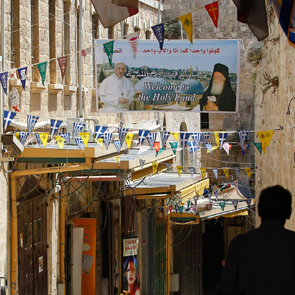
 Loading ...
Loading ...